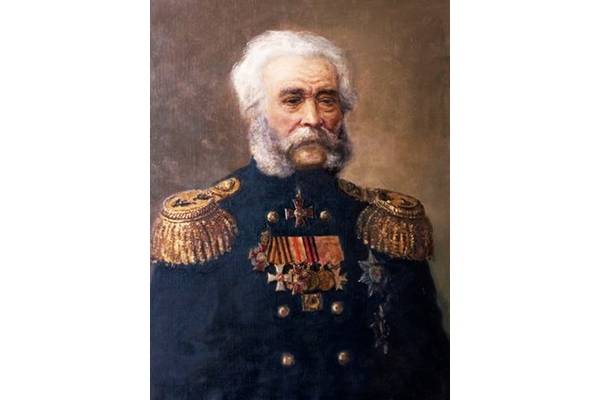Admiral Peter Anjou - Russian Arctic explorer

220 years ago was born Peter of Anjou, an outstanding Russian navigator and polar explorer
The ancestors of Anjou were Protestants who lived in the French province of Anjou, they moved to Russia because of persecution by Catholics. In the 18th century, our country became a new home for refugees from enlightened France.
Petr Fedorovich was born on February 15 of 1797 in Vyshny Volochek in the family of a county doctor. The family has long since become Russified, and only the last name distinguishes Peter from Anjou from other Russians. Primary education received in a private pension, hosted by the capital Marine Corps. In his free time, Petya read books about long-distance voyages, and the boarding director Dmitry Sorokin brought essays about great travelers and sea expeditions to an inquisitive boy. The direction of the future life was laid in childhood.
Naturally, Peter continued his studies in the Marine Corps. He studied with Ferdinand Wrangel, Anjou and Wrangel were the best on the course. Even then, two friends decided to study the Arctic - at the beginning of the XIX century this region was still little studied, the Great Northern Expedition under the general guidance of Vitus Bering and Alexei Chirikov marked only the upper border of mainland Eurasia, and what was to the north was unknown.
Upon completion in 1815, the Sea Corps of Anjou with Wrangel were sent to the Baltic Fleet. After five years of service in the Baltic, midshipman Fyodor Anjou was promoted to lieutenant and appointed head of the Ust-Yansk polar expedition, its task was to describe the northern shores of Siberia from the Olenka river to Indigirka. It is noteworthy that Ferdinand Wrangel received the appointment of the head of the expedition, which was to explore the territory east of the Indigirka River.
In addition, the detachments faced the task of finding the mysterious land of Sannikov, she received the name of the Russian merchant who claimed that he had seen this land.
In 1820-1824, the Anjou squad made an inventory of the coast and islands of the Lyakhovsky Big and Small, Boiler, Faddeev, New Siberia, Semenovsky and others, examined numerous rivers, including Lena, capes, bays and bays. Sannikov’s land, of course, was not discovered by navigators.
Russian travelers on his return to St. Petersburg personally took Alexander I. Peter of Anjou was promoted to lieutenant commander and awarded the Order of St. Vladimir 4 degree.
The following year, Pyotr Fyodorovich was assigned to the expedition of Colonel Fyodor Berg. In the winter of 1825-1826, the detachment investigated the northeastern coast of the Caspian Sea, the western coast of the Aral Sea, and made a cartographic survey in the Kirghiz steppes (the territory of modern Kazakhstan and Uzbekistan).
For participation in this expedition, Peter of Anjou was awarded the Order of St. Anne 2 degree.
After two land expeditions (most of the research of the Ustya-Yansk expedition was made from land), Lieutenant-Commander Anjou was assigned to the ship "Gangut", here he commanded the ship's artillery.
8 (20) October 1827, the "Gangut" took part in the famous battle of Navarino. Anjou received a contusion during the battle, but remained in the ranks until the end, for which 21 December 1827 was awarded the Order of St. George 4 degree.
Another 17 years Pyotr Fedorovich served in the Baltic navy, 10 years he was the head of the port in Kronstadt, here he built a line of underwater defensive structures that prevented enemy ships from approaching St. Petersburg. He completed his career in the administrative field with the rank of admiral.
Peter died of Anjou 12 on November 1849 of the year. Buried at Smolensk Lutheran cemetery of St. Petersburg.
Information